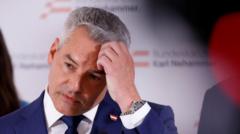Austria's political scene is in disarray as Chancellor Karl Nehammer has declared his intention to step down from both his position as Chancellor and leader of the conservative People's Party (ÖVP). This decision comes after failed coalition negotiations with the Social Democrats and the liberal Neos party, both of which could not reach consensus on significant issues. The collapse of these discussions follows the far-right Freedom Party's (FPÖ) substantial electoral success in September, where it garnered nearly 29% of votes, but has been isolated by the established parties rejecting the possibility of a coalition with its leader Herbert Kickl.
The FPÖ has positioned itself as a notable contender for power in a landscape increasingly characterized by dissent over migration, economics, and the impacts of the war in Ukraine. Following the halted coalition talks, the FPÖ has criticized the perceived chaos, demanding not only Nehammer's departure but also calling for Social Democrat leader Andreas Babler to resign. Moreover, they have placed some blame on President Alexander Van der Bellen for the current turmoil in the political sphere.
As Austria grapples with the fallout from these failed negotiations, analysts suggest potential paths forward. The People's Party might consider forming a coalition with the FPÖ, which could significantly shift the political dynamics in Austria. Public opinion surveys indicate the FPÖ's popularity has risen post-election, and they may advocate for a new election, arguing that the last three months were wasted in most fruitless discussions.
However, the FPÖ's controversial history, including its founding ties to former Nazis and its recent scandals, complicates its standing in the political arena. With the Austrian voters having demonstrated robust turnout amid key societal concerns, the future direction of the country remains uncertain as discussions around migration policies and national security persist as the focal points of political debates. The fragmentation of coalition possibilities may open new chapters in Austria's governance, with far-reaching implications for its domestic and international policies.




















